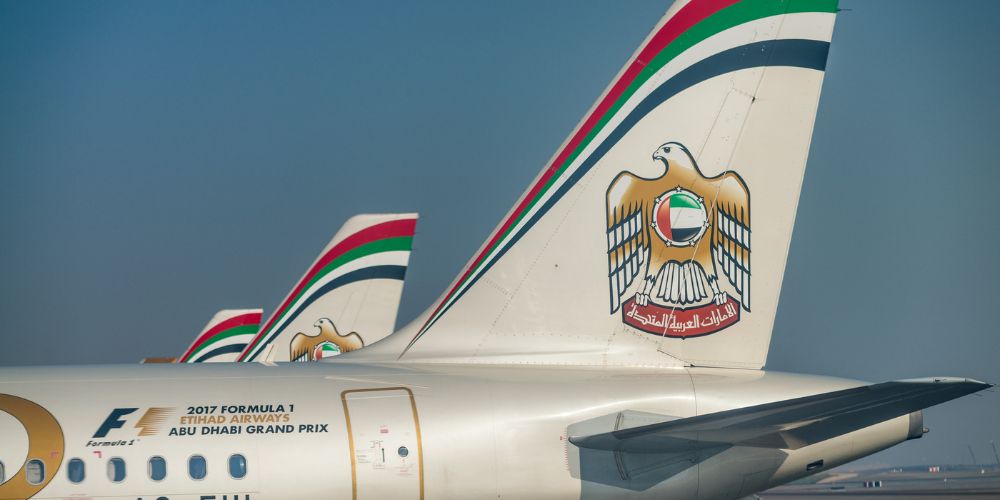Etihad Airways, recognized as one of the leading airlines in the aviation industry, has achieved remarkable success since its establishment.
However, the intricate details of its ownership structure often remain undisclosed to the general public.
So, who owns Etihad Airways? What’s the ownership structure like?
In this comprehensive article, we delve deep into the ownership architecture of Etihad Airways, shedding light on the key stakeholders, their roles, and their vital contributions to the airline’s operations and growth.
Historical Background
Etihad Airways took flight in July 2003 when it was founded by Royal (Amiri) Decree as the national carrier of the United Arab Emirates (UAE).
The ambitious vision of the Emirate of Abu Dhabi served as the driving force behind the creation of the airline, with the aim of challenging major global carriers.
Over the years, Etihad Airways has experienced significant expansion, launching new routes, expanding its fleet, and capturing a substantial share of the aviation market.

The Role of Etihad Aviation Group
At the forefront of Etihad Airways stands the Etihad Aviation Group, which acts as the parent company overseeing and coordinating various divisions and entities within the organization.
Serving as a holding company, the Etihad Aviation Group ensures a cohesive approach to business operations, streamlining activities and promoting synergy between subsidiaries and associated companies.
Who Owns Etihad Airways? Ownership Structure
To fully understand the ownership landscape of Etihad Airways, it is crucial to recognize and analyze the major stakeholders involved. The key players shaping the ownership structure of the airline include the government of Abu Dhabi, sovereign wealth funds, and strategic partners. Let’s take an in-depth look at each of these stakeholders:
1. Government of Abu Dhabi
The government of Abu Dhabi plays a pivotal role in the growth and success of Etihad Airways. As the majority stakeholder, it retains a significant ownership share, reflecting its commitment to the airline’s operations and development.
The government’s unwavering support for Etihad Airways has allowed the carrier to establish a strong position within the highly competitive aviation market.
2. Sovereign Wealth Funds
Alongside the government of Abu Dhabi, other sovereign wealth funds have invested in Etihad Airways. These funds provide additional financial backing, reinforcing the airline’s stability.
One notable sovereign wealth fund associated with Etihad Airways is the Abu Dhabi Developmental Holding Company (ADDH), which supports the government’s broader economic diversification strategy.
3. Strategic Partners
Etihad Airways has forged strategic alliances with various carriers, enabling the airline to expand its global reach and provide an extensive network of destinations to passengers.
These partnerships involve both codeshare agreements and equity investments. Notable strategic partners include Air Serbia, Air Seychelles, Jet Airways, and Virgin Australia. These alliances facilitate shared resources, increased connectivity, and enhanced customer benefits.
Government Involvement
Government Involvement in Ownership Structure
The government of Abu Dhabi plays a pivotal role in the growth and success of Etihad Airways. As the majority stakeholder, the government retains a significant ownership share, reflecting its commitment to the airline’s operations and development.
However, the involvement of the government in Etihad Airways goes beyond mere ownership. It extends to actively shaping the strategic direction of the airline, ensuring that it aligns with the broader vision set forth by the Abu Dhabi government.
As a state-owned entity, Etihad Airways represents the interests of the United Arab Emirates (UAE) on the global stage. This involvement imbues the airline with a sense of national pride and responsibility.
By aligning their goals and objectives with those of the government, Etihad Airways remains focused on the long-term sustainability and prosperity of the airline and contributes to the overall economic growth of Abu Dhabi and the UAE.
The government’s involvement in the ownership structure of Etihad Airways serves as a testament to its unwavering commitment and support for the airline.
This support encompasses various aspects, including financial backing, regulatory oversight, and diplomatic representation. With a stake in the airline, the government has a vested interest in ensuring that Etihad Airways maintains its position as a global leader in aviation.

Moreover, the government plays a crucial role in establishing partnerships, both domestically and internationally, to enhance the airline’s network and connectivity.
Strategic alliances and partnerships with other carriers are often facilitated and supported by the government, creating synergistic relationships that benefit both Etihad Airways and the respective airlines involved.
The government’s involvement also extends to providing additional resources and support during times of crisis or significant challenges faced by the aviation industry. This may include financial assistance, policymaking, and regulatory measures to mitigate the impact on Etihad Airways and ensure the airline’s continued operations.
In conclusion, the government of Abu Dhabi’s active involvement in the ownership structure of Etihad Airways goes beyond ownership.
Its participation embodies a commitment to the airline’s strategic direction, long-term sustainability, and representation of the UAE’s interests on the global stage. The government’s support and resources contribute to the success and growth of Etihad Airways, making it a prominent player in the aviation industry.
Who Owns Etihad Airways? Recent Changes in Ownership
In 2018, Etihad Airways witnessed a significant shift in ownership as the Abu Dhabi Developmental Holding Company (ADDH), a sovereign wealth fund, assumed majority ownership.
This change aligns with the government’s strategy to optimize its portfolio and enhance the performance of strategic assets. The transition aims to strengthen the airline’s market position and streamline operations, in pursuit of greater efficiency and profitability.
Impact on Operations
The ownership structure of an airline plays a crucial role in shaping its strategic decisions, operational policies, and customer-centric initiatives. With the government of Abu Dhabi as the majority stakeholder, Etihad Airways benefits from both stability and support.
This enables the airline to invest in state-of-the-art technology, expand its fleet, and provide innovative services to enhance the overall passenger experience. The long-term commitment of the government and strategic partners contributes significantly to the continuous growth and development of Etihad Airways.
Frequently Asked Questions
How is Etihad Airways owned?
Etihad Airways is primarily owned by the government of Abu Dhabi, with a majority stake.
Who are the major stakeholders of Etihad Airways?
The major stakeholders of Etihad Airways include the government of Abu Dhabi, sovereign wealth funds, and strategic partners.
What is the role of the Abu Dhabi government in Etihad Airways?
The Abu Dhabi government plays a significant role as the majority stakeholder, shaping the airline’s strategic direction and providing support for its operations.
Has there been any recent change in the ownership structure of Etihad Airways?
Yes, in 2018, the ownership of Etihad Airways was transferred to the Abu Dhabi Developmental Holding Company (ADDH), a sovereign wealth fund.
Conclusion
Etihad Airways, with its prominent presence in the aviation industry, owes much of its success to a robust ownership structure. The government of Abu Dhabi, supported by sovereign wealth funds and strategic partners, plays a vital role in the airline’s growth and accomplishments.
Understanding the ownership dynamics behind industry giants like Etihad Airways allows travelers to appreciate the efforts of these important stakeholders.
With a solid ownership structure in place, Etihad Airways continues to redefine air travel and stands poised for sustainable growth and profitability.


 Tags:
Tags:










